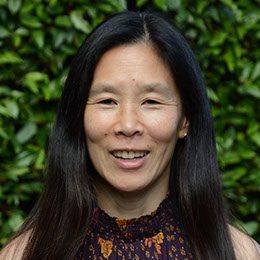Fields of Research
- Gene Architecture and Action
- Molecular Basis of Disease
- Protein Structure
Research Summary
TFIID transcription factor complex in the regulation of gene expression, cell proliferation and its dysregulation in human disease.
Research Statement
The major research interest of the Wang lab is the regulation of gene transcription and its role in cell proliferation and human disease. Our studies focus on the function of the transcription factor complex TFIID and how mutations in its TAF subunits contribute to cancer, neuronal developmental disease and degenerative disorders. The Wang lab uses molecular and structural biology as well as biochemical approaches to
- investigate the normal function of the largest TFIID subunit TAF1 in gene transcription,
- characterize debilitating mutations in TAF1 that may contribute to cancer or cognitive impairment and
- assess the potential of TFIID subunits as drug targets or diagnostic markers for human disease.
Our long-term goal is to understand how dysregulation of gene transcription promotes disease and to use this information to identify new diagnostic and therapeutic approaches to improve human health.
Awards and Honors

Edith Wang
Associate Professor and Assistant Dean for Basic Sciences
Affiliations
UW Department of Pharmacology
UW Molecular & Cellular Biology Graduate Program

Edith Wang
Associate Professor and Assistant Dean for Basic Sciences
Affiliations
UW Department of Pharmacology
UW Molecular & Cellular Biology Graduate Program
Faculty
- Building:
- Health Sciences Building
- Room:
- E-417
- Box:
- 357280
- Phone:
- 206-616-5376
- Web Link:
- https://edithwang17.wixsite.com/wanglabuwphcol
Lab
- Building:
- Health Sciences Building
- Room:
- E406, 408
- Box:
- 357280
- Phone:
- 206-616-5917
- Web Link:
- https://edithwang17.wixsite.com/wanglabuwphco

Edith Wang
Associate Professor and Assistant Dean for Basic Sciences
Affiliations
UW Department of Pharmacology
UW Molecular & Cellular Biology Graduate Program
PHCOL401
PHCOL510
PHCOL513
PHCOL535
NEURO501

Edith Wang
Associate Professor and Assistant Dean for Basic Sciences
Affiliations
UW Department of Pharmacology
UW Molecular & Cellular Biology Graduate Program
Alex Bouterse (undergraduate researcher)
Savannah Farrell (undergraduate researcher)
Max Hamby (undergraduate researcher)

Edith Wang
Associate Professor and Assistant Dean for Basic Sciences
Affiliations
UW Department of Pharmacology
UW Molecular & Cellular Biology Graduate Program
Select Publications
Curran, E.C., Wang, H., Hinds, T.R., Zheng, N., Wang, E.H. 2018. Zinc knuckle of TAF1 is a DNA binding module critical for TFIID promoter occupancy. Sci Rep. 8:4630.
Hurst, S.A., Liktor-Busa, E., Moutal, A., Parker, S., Rice, S., Szelinger, S., Senner, G., Hammer, M., Johnstone, L., Ramsey, K., Narayanan, V., Perez-Miller, S., Khanna, M., Dahlin, H., Lewis, K.A., Craig, D., Wang, E.H., Khanna, R., Nelson, M.A. 2018. A novel TAF1 variant affects gene expression and is associated with X-linked TAF1 intellectual disability syndrome. Neuronal Signaling 2: NS20180141.
Kountz T.S., Lee K.S., Aggarwal-Howarth S., Curran E.C., Park J.M., Harris D.A., Stewart A., Hendrickson J., Camp N.D., Wolf-Yadin A., Wang E.H., Scott J.D., and Hague C. 2016. Endogenous N-terminal domain cleavage modulates 1D-adrenergic receptor pharmacodynamics. J. Biol. Chem. 291: 18210-18221.
O’Rawe, J.A., Wu, Y., Dörfel, M.J., Rope, A.F., Au, P.Y., Parboosingh, J.S., Moon, S., Kousi, M., Kosma, K., Smith, C.S., Tzetis, M., Schuette, J.L., Hufnagel, R.B., Prada, C.E., Martinez, F., Orellana, C., Crain, J., Caro-Llopis, A., Oltra, S., Monfort, S., Jiménez-Barrón, L.T., Swensen, J., Ellingwood, S., Smith, R., Fang, H., Ospina, S., Stegmann, S., Den Hollander, N., Mittelman, D., Highnam, G., Robison, R., Yang, E., Faivre, L., Roubertie, A., Rivière, J.B., Monaghan, K.G., Wang, K., Davis, E.E., Katsanis, N., Kalscheuer, V.M., Wang, E.H., Metcalfe, K., Kleefstra, T., Innes, A.M., Kitsiou-Tzeli, S., Rosello, M., Keegan, C.E., Lyon, G.J. 2015. TAF1 variants are associated with dysmorphic features, intellectual disability, and neurological manifestations. Am J Hum Genet. 97: 922-932.
Wang, H., Curran, E.C., Hinds, T.R., Wang, E.H., and Zheng, N. 2014. Crystal Structure of a TAF1-TAF7 complex in human transcription factor IID reveals a promoter binding module. Cell Res. 24: 1433-1444.
Kloet, S.L., Whiting, J.L., Gafken, P., Ranish, J., and Wang, E.H. 2012. Phosphorylation-dependent regulation of cyclin D1 and cyclin A gene transcription by TFIID subunits TAF1 and TAF7. Mol. Cell. Biol. 32: 3358-3369.
Lee, K.-S., Campogan, D.W., Lewis, K.A., Tom, S. Wayner, E.A., and Wang, E.H. 2011. Monoclonal antibodies against Muscleblind-like 3 (Mbnl3), a protein with punctate nuclear localization. Hybridoma 30: 181-188.
Lee, K.-S., Cao, Y., Witwicka, H., Tom, S., Tapscott, S.J., and Wang, E.H. 2010. RNA binding protein Muscleblind-like 3 disrupts myocyte enhancer factor 2 beta-exon splicing. J. Biol. Chem. 285: 33779-33787.
DeFino, M.C., Wacker, J.L., Lyssand, J.S., Wang, E.H., and Hague, C. 2010. Differential regulation of GPR54 transcription by specificity protein-1 and partial estrogen response element in mouse pituitary cells. Biochem. Biophys. Res. Commun. 393: 603-608.

Edith Wang
Associate Professor and Assistant Dean for Basic Sciences
Affiliations
UW Department of Pharmacology
UW Molecular & Cellular Biology Graduate Program
